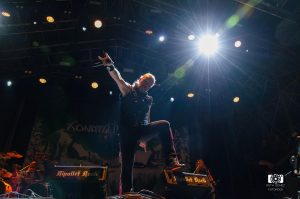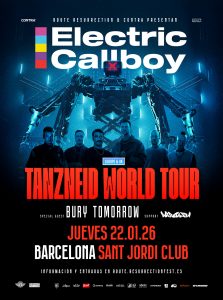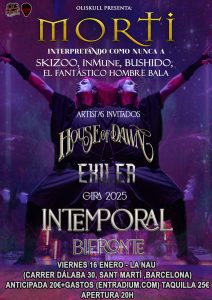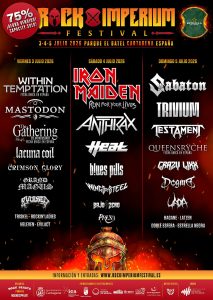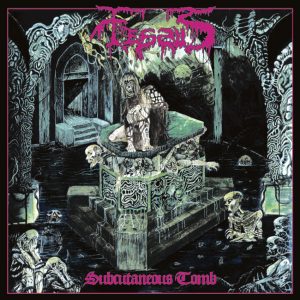INTERVIEW: PORTRAIT – Unveiling the Occult and Defiance: Inside Portrait’s Concept Album «The Host»

In this interview with Christian, guitarist of the Swedish heavy metal band Portrait, we dive deep into the creation of their latest concept album The Host, exploring not just its musical intricacies but also the fascinating historical folklore that drives its narrative. Along the way, Christian shares some candid thoughts about Sweden’s current socio-political landscape, which, ironically, offers its own dark inspiration amid growing surveillance and a dwindling freedom of speech.
-Hi, first off thanks for taking your time. How’s everything going in the Portrait camp?
Everything is good here, thanks! We’re currently preparing for a couple of shows in Germany and France at the end of September. Looking forward to it!
-Your newest album, ‘The Host’, was released on Midsummer’s Eve—the night when the story of the album begins. Can you tell us a bit about the significance of releasing the record on that day?
Midsummer’s Eve is a liminal night in Swedish folklore, connected to many forms of magic—primarily divination, but also rituals like harvest blessings. It’s said that the veil between the human world and the unseen is especially thin that night, amplifying the magical properties of plants. It shares some similarities with Christmas Eve and New Year’s Eve folklore, where you might witness the «mass of the dead» if you peek through a church keyhole late at night. Ancestors are said to return, and it’s a time for year-walks, where people saw visions of who would marry, die, or how the harvest would turn out. Midsummer’s Eve is also connected to the feeding of household spirits and dead ancestors. In the album’s story, this night is significant because it’s steeped in magical practice and idolatry, something despised by the church.
-‘The Host’ is your first concept album. Was this something you had planned, or did it happen naturally? And what are some of your favorite concept albums that may have inspired you?
It’s something we discussed for a long time, and finally, the timing felt right. I read an article about 17th-century Swedish soldiers who made pacts with the devil before going off to war, and that sparked the story. Once we had the outline, the songwriting came very naturally. It was a deeply inspired process from start to finish.
-What is the central concept of the album, and what are the key themes or stories?
The core themes are occult in nature. For those who are interested in these matters, the symbols and messages will be apparent. But the story should also be viewed as a reflection of «as above, so below»—challenging spiritual authorities inevitably has consequences on the temporal plane. In this story, the church and its servants are the avatars of this cosmic/demiurgic impulse.
-How different was it to write a concept album compared to your previous works?
It was a bit different, yes, but the process still felt natural. That’s how it has to be—if you force it, the result will be terrible. One notable difference is the album’s length. Without the concept holding it all together, we probably would have split this material across two albums. But since the concept ties everything together, we felt it was best to proceed this way. Musically, there’s great diversity; none of the songs are too similar to each other.
-The Adversary plays a key role in this story. Who or what is the Adversary? Satan has many faces, after all.
The Adversary in this context is tied to the protagonist’s evolution. He internalizes the Satanic impulse (Satan meaning «accuser») as a result of the pact he makes in the first song. At first, he has limited spiritual experience, only knowing what the church has taught him about Satan as a «tempter.» But as the priest chooses who will go to war, the protagonist turns to the adversary of that institution. He uses the term «devil» in his pact, but by the time we get to The Sacrament, he begins to think of this devil as «Satan.» However, the entity that responds to his prayers turns out to be someone else, which is one of the album’s occult points—the power lies in intent and will, beyond words.
-Can these multiple faces of the Adversary also apply to the interpretation of the lyrics and story?
Absolutely. I have a specific interpretation of the story that resonates with me personally, but of course, others will read it differently. Some might even interpret the story metaphorically, as a call for rebellion within the temporal world. That isn’t wrong, but it doesn’t capture the full picture of what I intended.
-Portrait is one of the few modern heavy metal bands (alongside RAM) that delve into the occult. Is this theme well accepted in the genre, or does its ambiguity make it a double-edged sword?
I’d say 99.9% of people don’t care about the occult aspect at all. Some think it’s «cool» on a surface level, while others find it silly. But for me, the most important thing is that it’s personally meaningful and still inspires our music.
-Are the occult elements in your lyrics purely aesthetic, or do they come from personal experience and practice? I sense a strong Gnostic influence.
The lyrics are rooted in insights and experiences that come from actual practice and work, not just aesthetic choices.
-The story takes place in Sweden. How do your country and surroundings inspire you?
I wouldn’t say I’m specifically inspired by Sweden itself, though our natural surroundings can certainly trigger inspiration. However, I do find a lot of hypocrisy in Swedish politics. There are worrying trends—law changes leading to increased surveillance and decreased freedom of speech. It’s definitely something that needs to be counteracted.
-Which historical events, if any, inspired these lyrics?
The article I mentioned, “Med Satan i ryggen i Guds armé” («In God’s Army with Satan at Your Back»), was an inspiration. It covers various court cases involving soldiers and citizens accused of making devil-pacts. That article gave the exoteric shell of the story, but the deeper meanings and intentions are my own.
-The story is set in the 17th century, but it feels timeless. If the protagonist lived in the 21st century, what might his motivations or struggles be? What are today’s most pressing issues?
Even today, we’re still being told what to think and believe, though the source isn’t always the church. On top of that, there’s the rise of the digital age—the so-called fourth industrial revolution—which constantly distracts us from seeking truth, both in the mundane world and on spiritual levels. The impulse to keep us in chains is still very much alive.
-Moving to the music, this album contains some of your most extreme songs to date—‘Sword of Reason (The Steel of Revenge)’ being a prime example with its black metal inspiration. What can you say about this track and the album’s diverse sound? How do you maintain cohesion with such a variety of influences?
The new album pushes us further in different directions, including more extreme metal styles in tracks like «Sword of Reason» and «Sound the Horn.» We draw inspiration from everything we enjoy—from Survivor to Blasphemy. The beauty of Portrait’s sound is its flexibility, allowing us to explore these extremes without losing our core identity.
-This is your first full-length album with your new guitarist, Karl. What has he brought to the band and to ‘The Host’?
Karl is an incredibly talented guitarist and puts a lot of dedication into the band. He also wrote «Treachery,» showcasing his songwriting abilities, which is a huge asset to the band.
-Portrait has had several lineup changes over the years. Has that ever been draining for you, or do such challenges make the band stronger in the long run?
Lineup changes are always setbacks. It takes time to learn how to gel with someone new both musically and personally. But without those changes, we wouldn’t have the current lineup, which I believe is the strongest we’ve ever had.
-And finally, what’s next for Portrait?
As I mentioned, we have some European shows lined up this fall, and early next year we hope to tour Latin America for the first time. The plan for next year is to play as many shows as possible!
-That’s all from us. Thanks again for taking the time to chat. Any final words?
Hail and kill!



